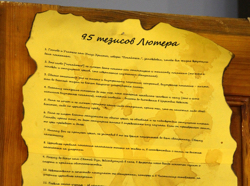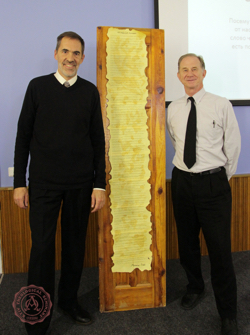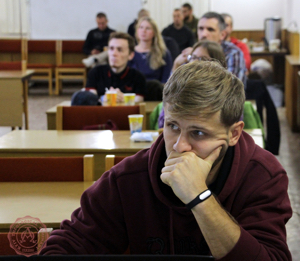 500 years have passed since the beginning of Reformation in Europe. October 31, 1517, when a Catholic monk Martin Luther nailed his famous "95 Theses" to the gates of the Wittenberg Church is considered to be beginning of the Reformation. These theses concerned the abuses within the Catholic Church and practice of selling indulgences that promised forgiveness of sins for money and not as result of true repentance. The ideology of what was later called the Reformation can be summarized in these five theses: only the Scripture, only faith, only grace, only Christ and all glory only to God.
500 years have passed since the beginning of Reformation in Europe. October 31, 1517, when a Catholic monk Martin Luther nailed his famous "95 Theses" to the gates of the Wittenberg Church is considered to be beginning of the Reformation. These theses concerned the abuses within the Catholic Church and practice of selling indulgences that promised forgiveness of sins for money and not as result of true repentance. The ideology of what was later called the Reformation can be summarized in these five theses: only the Scripture, only faith, only grace, only Christ and all glory only to God.
This season abounds in thematic seminars, conferences and events dedicated to the Reformation. The Kyiv theological seminary did not stay away from the celebrations. On Tuesday, October 31, the seminary Profs. Dr. Jim Ehrhard and Andy Rist presented seminars on topics "Calvin - Pastor, Luther - Man and Father". They explored little-known pages from the lives and ministry of such prominent Reformation leaders as Martin Luther and Jean Calvin.
 Prof. Andy Rist reminded the audience of the three great achievements of Martin Luther that changed the world: 95 theses that gave impetus to subsequent changes in the religious world, the translation of the Bible into German and the reformation of the institution of marriage and Christian home – things that are rarely mentioned.
Prof. Andy Rist reminded the audience of the three great achievements of Martin Luther that changed the world: 95 theses that gave impetus to subsequent changes in the religious world, the translation of the Bible into German and the reformation of the institution of marriage and Christian home – things that are rarely mentioned.
Speaking about Luther's marriage, Prof. Rist pointed out that Martin Luther had raised marriage and family life to a higher level. Luther declared: "Marriage is not just something natural and physical, it is a gift of God. It stands above the celibacy." For the time, such teaching and practice of Luther was very radical.
 Dr. Jim Ehrhard, speaking about Jean Calvin, remarked that many misunderstood Calvin's life and service because they had never read his sermons. Jean Calvin is well known as a theologian, but first of all he was a pastor. He spent the most of his active life pastoring the church in Geneva, except for three years when he was banished to Strasbourg. While in exile, Calvin came to a fuller understanding what it means to be a pastor. He spent much of the time with people, visiting them, carrying for the community, teaching and preaching.
Dr. Jim Ehrhard, speaking about Jean Calvin, remarked that many misunderstood Calvin's life and service because they had never read his sermons. Jean Calvin is well known as a theologian, but first of all he was a pastor. He spent the most of his active life pastoring the church in Geneva, except for three years when he was banished to Strasbourg. While in exile, Calvin came to a fuller understanding what it means to be a pastor. He spent much of the time with people, visiting them, carrying for the community, teaching and preaching.
Dr. Ehrhard taught the listeners six lessons a preacher can learn from Calvin's sermons. A sermon should be Biblical and explain the text of the Scriptures, be not "dead" but "living”, point to the grace of Jesus and emphasize practical application, it should by done with a humble heart. Jean Calvin's pastoral ministry is often neglected and requires a more thorough study.
During the breaks the participants had an opportunity to speak in person with the lecturers and discuss Luther’s and Calvin's life and ministry.

